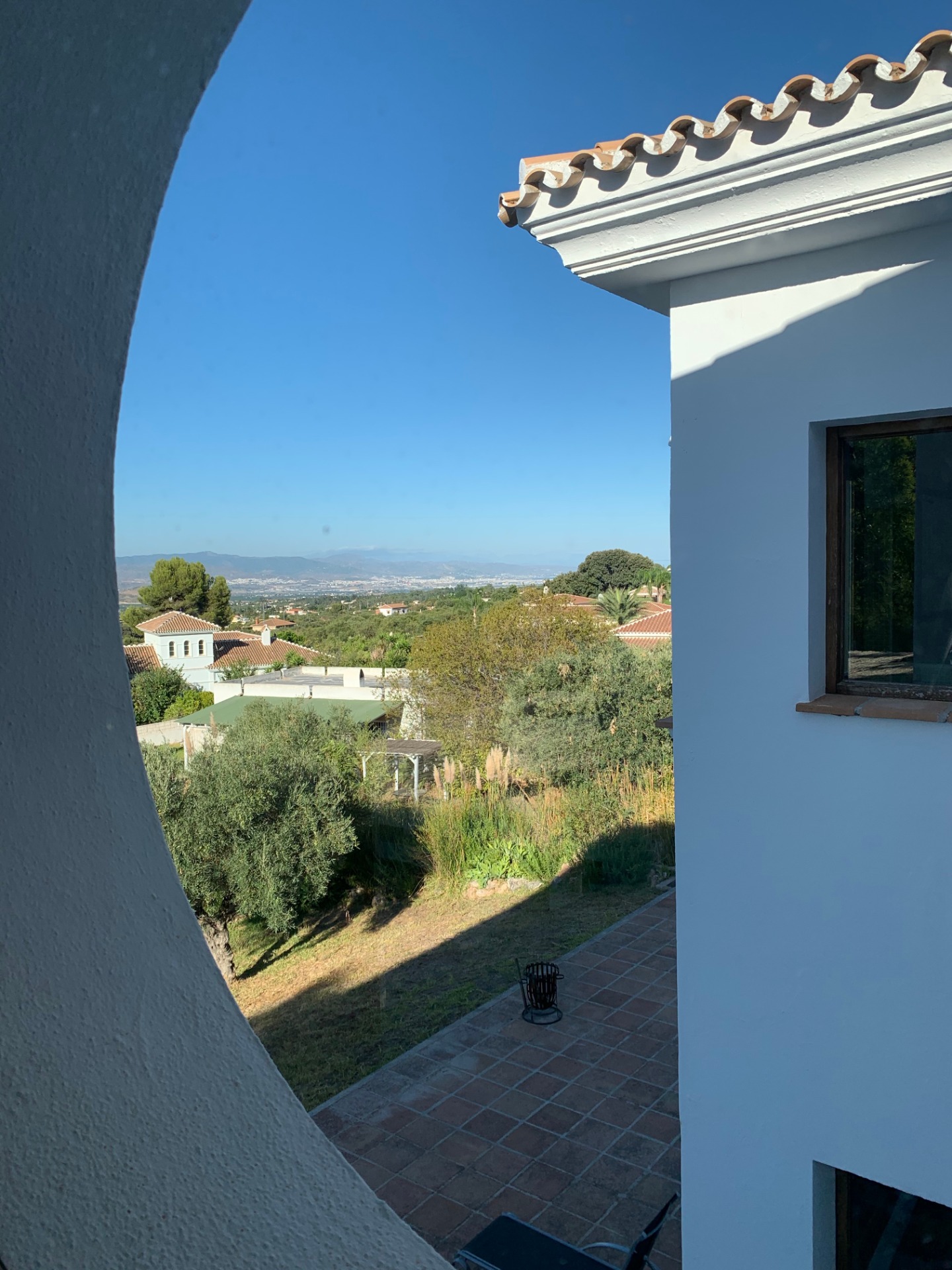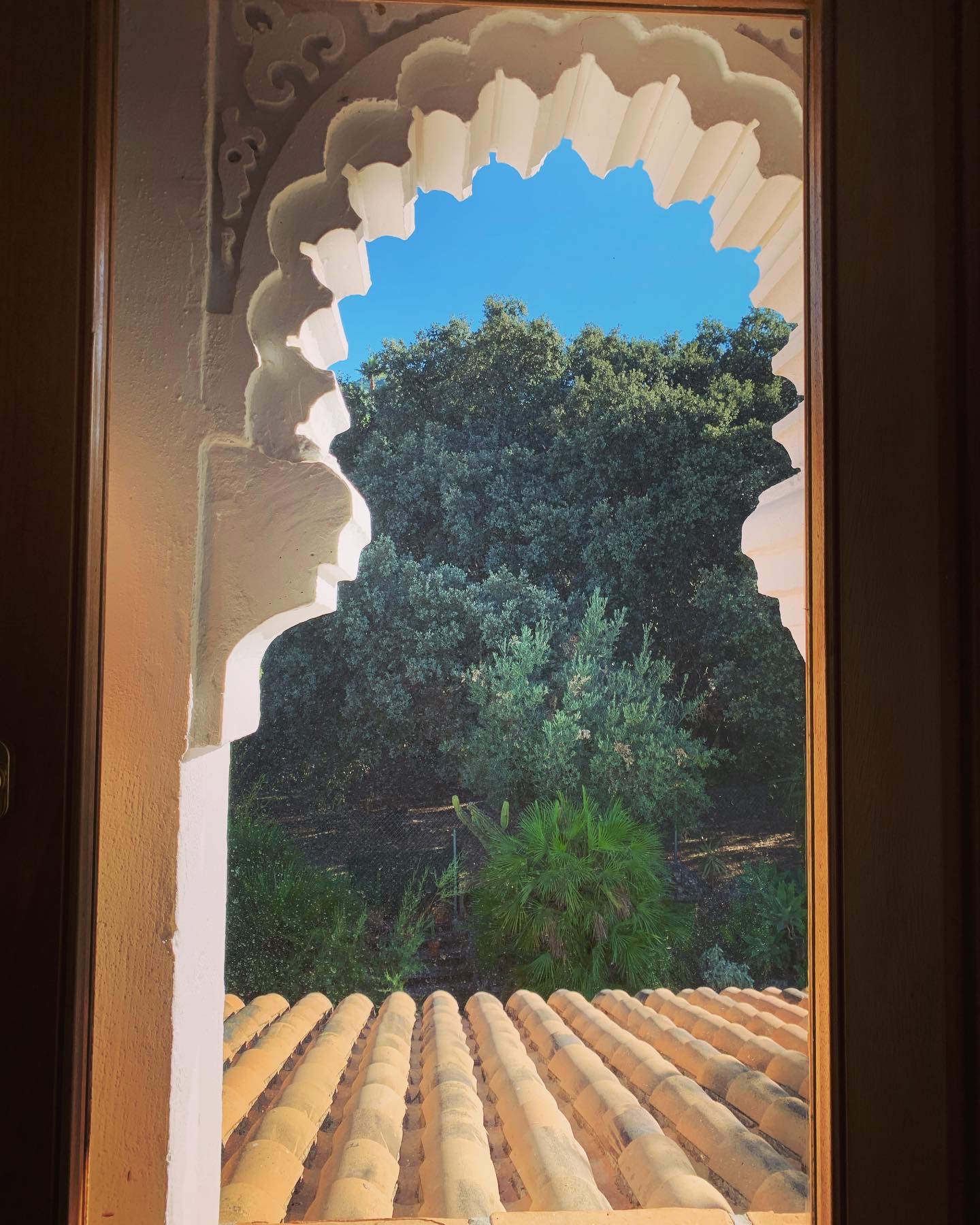BAJO EL OLIVO
ABOUT US

Dear Applicants:
"Bajo el Olivo", part of Villa "CASA MIA" is a private artist retreat/residency facilitated by Juliana España Keller and her husband, Rudolf Keller who moved to Spain in January (2020) from Melbourne, Australia.
The residency is situated on private land (2136 sqm) in the quiet annex of a mediterranean villa that houses three furnished guest rooms. 'CASA MIA' is easily accessible by car and nestled in the small community of 'Urbanizacion San Jorge'; situated on the outskirts of the pueblo (small village) of 'Alhaurín el Grande'; just (25) minutes inland from the city of Malaga and very close distance to Malaga Airport. We are also in close vicinity (about 25 minutes) to the beautiful sandy beaches of the Costa del Sol and the vibrant villages of Fuengirola, Marbella, Ojén and Mijas.
'Bajo el Olivo' is an experimental residency space dedicated to artists who are looking for a private space to write and create during these exceptional times we are living on this planet. This artistic retreat is designed for artists who require a thinking space in nature and seeks participants that are seriously thinking about an ecology of care, empathy and community building while the world is earnestly searching for social political and economic change with a posthuman approach to social engagement, social and spatial practices and a forward thinking into the future with an affirmative ethical stance.
Artists are invited to live on-site to create the initial process of an art work in a situated perspective or as field work, research or writing project. 'Bajo el Olivo' is designed to offer the resident the time off to manifest ideas while surrounded by nature.
We provide a working desk in your private room and to benefit from the simple pleasures of living in rural Spain, we invite you to use the surrounding terrain of the villa as your studio. There are many areas to sit and contemplate and write or sketch in nature or you may feel like working on the grounds of the roofed terraces or open spaces in the field. For painters, or sculptors (in the case of weather patterns) we do have working tables, painting easels, drop-cloths, supplemental ring lighting in the working space upstairs in the gallery area on the first floor.
We invite all independent creators, thinkers, artists, writers & researchers, to come and stay with us inclusive of non-binary, BIPOC artist folk. We are seeking material entanglements that provide collaboration, community building in the local area and we provide access to available technical resources on site.
#ResidenciesForUkraine #NoToWar #ResidenciesWithoutBorders #ResArtisForUkraine #StandWithUkraine #StandwithPALESTINE
"Multispecies ethnography is a rubric for a more-than-human approach to ethnographic research and writing rapidly gaining discursive traction in anthropology and cognate fields. The term is deployed for work that acknowledges the interconnectedness and inseparability of humans and other life forms, and thus seeks to extend ethnography beyond the solely human realm. Multispecies investigations of social and cultural phenomena are attentive to the agency of other-than-human species, whether they are plants, animals, fungi, bacteria, or even viruses, which confound the species concept. This entails a challenge to the humanist epistemology upon which conventional ethnography is predicated, specifically its ontological distinctions between nature and culture, human and nonhuman, subject and object. Multispecies ethnography must thus be seen as a part of a larger quest in the social sciences and humanities to replace dualist ontologies by relational perspectives, to overcome anthropocentrism by pointing to the meaningful agency of nonhuman others, and to highlight the intersections between ecological relations, political economy, and cultural representations. Multispecies ethnography however, not only acknowledges that humans dwell in a world necessarily comprising other life forms but also contends that their entanglements with human lives, landscapes, and technologies must be theoretically integrated into any account of existence". Locke, Piers, and Ursula Munster. Multispecies ethnography. Oxford: Oxford University Press, 2015.
Submissions
THE OPEN CALL FOR RESIDENCY STAYS are listed on the Res Artis website also.
Please note that the rates for 2025 are posted on this website. We are trying hard to keep our costs low and not to charge residents exuberant rates.
Please go to the drop-down menu above to view the webpage: CLICK HERE TO APPLY. You can then download the documents on the APPLICATION FORMS & GUIDELINES CRITERIA webpage.
Location - Alhaurín el Grande
Click here for interesting historical and demographic information about the typical picturesque Andalusian pueblo in the foothills of the Sierra Nieves mountains of Malaga and surrounding mountainous villages of Ronda, Cordoba, Granada and beyond. Figure below: CASA MIA from above, Urbanizacíon San Jorge, Alhaurín el Grande, Andalucia.


Juliana and Rudy Keller
BIOS
june 2025
Juliana España Keller is a transdisciplinary artist, avid gardener, educator and researcher whose research-creation projects explore embodied knowledge through immersive, multisensory environments. She/her engages sound, movement, performative installation, and ecological inquiry to investigate how the human body interfaces with non-human systems, often challenging dominant visual regimes through sensorial and spatial immersive environments.
She holds a PhD in Art & Philosophy (University of Melbourne, Australia) and her work is informed by feminist materialist studies, sensory anthropology, and acoustic ecologies. Collaboration is central to her methodology—working with scientists, choreographers, and technologists to develop experiential installations that expand how we perceive and intra-act with our surroundings.
A central project in her recent creative practice is "Liquid Breath", an immersive interactive installation exploring plant sensing, interspecies communication, and the complex exchanges between botanical life and human breath. Using time-lapse video, biosensors, and responsive audio environments, the work reveals the subtle vibrational worlds of plant life, inviting viewers into an atmospheric, reciprocal space of listening and attunement.
España Keller's projects have been presented internationally across Canada, Europe, and Australia. She has participated in numerous residencies and research-based initiatives, with an ongoing commitment to experimental pedagogy, process-based inquiry, and collective dialogue.
CEREUS // Acoustic Ecologies of the Anthropocene is a Montreal-based sound and media art collective comprising Dr. Juliana España Keller and Alex Pépin. Their interdisciplinary practice merges deep listening practices, spatial audio performance, and AI-generated visual narratives, choreographed somatic movement, to investigate the vibratory dialogues between human and non-human life forms in the Anthropocene.
Dr. Juliana España Keller is a Professor in Intermedia Practice, MFA Studio Arts Program, and the Department of Painting and Drawing. She brings a research-based, somatic, and ecological approach to immersive environments. Alex Pépin is a sound artist and multi-faceted musician. Together, they focus on the psychophysical potential of sound matter, designing multi-sensory installations with sound and visual media technologies and interactive performance systems. They also explore the intersections of speculative ecologies, sound phenomena, plant perception, and artificial intelligence—probing how sonic and visual forms create new affective encounters in digitally mediated space.
Their collaborations focus on their spatial sound performance work and reveal the instrumental, microtonal and electronic forces and intensities of sound phenomena.Both Rudy and Juliana hold Canadian and Swiss nationalities. Juliana was born in London, England.
Juliana teaches at Concordia University in Montreal, QC, in the Faculty of Fine Arts, Studio Arts program. Juliana lives and works between Montreal and Malaga but feels at home as a "Mile-Ender" as well as an "Andaluza"; something she values as a true Canadian.
Rudy Keller is a retiree of Swiss origin. These days he can be found walking on the surrounding hills of Alhaurin El Grande, Mijas and Tolox area with "Suzie" and our Spanish mastin "Skye", our dogs. He would love to introduce you to the various 'rutas' or walking trails in the area but you have to get up early to join him!
Juliana and Rudy are fluent in English, Spanish, German and French. Juliana is a home cook and bakes artisanal sourdough bread with stone-milled flour from the local mill.
There are (13) olive trees on the land amongst apricot, nectarine, guava, kiwi, passionfruit, bananas, papaya, kumquat, lime, lemon, orange, limequat, nispero, avocado, lychee and hazelnut that are all flourishing.
Juliana and Rudy grow many vegetables in their landscaped garden and there are many areas on the land that can be used as performative sites or quiet areas, just to think, write, work and create.....

Most all of our vegetables and fruit are grown organically on our land.
Did you know that "CASA MIA" Villa is named after our first grand-child: Mia Raye Doddo-Keller.
AS OF JUNE 2024, A COVID CERTIFICATE IS NO LONGER REQUIRED FOR PROOF OF RESIDENCY.
Just to add: We are a pet-friendly environment and partners are welcome.
Part of our family is our house cat: Simba and our dogs: Suzie Q. and Skye.
Please note that partners of Guest Residents must pay their individual home-stay as part of the terms of service of their residency stay at CASA MIA....
